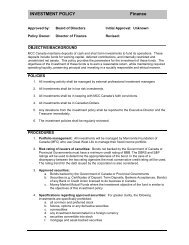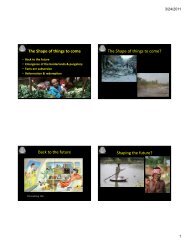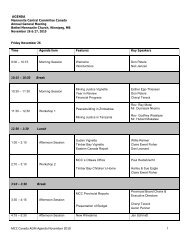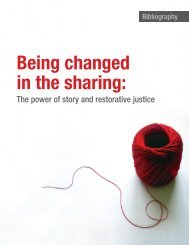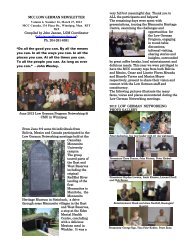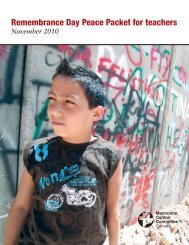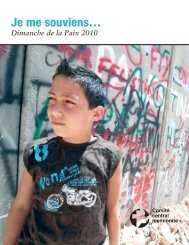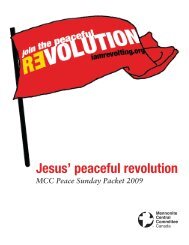Walking together: Healing and hope for Colombian refugees
Walking together: Healing and hope for Colombian refugees
Walking together: Healing and hope for Colombian refugees
Create successful ePaper yourself
Turn your PDF publications into a flip-book with our unique Google optimized e-Paper software.
70<br />
w a l k i n g<br />
t o g e t h e r<br />
TALKING ABOUT TRAUMA<br />
Remembrance <strong>and</strong> Mourning<br />
Talking to <strong>refugees</strong> about traumatic experiences from their home country may seem like a delicate <strong>and</strong><br />
complicated issue, <strong>and</strong> rightly so. Conversations about past traumas have the potential to heal - or to<br />
re-traumatize.<br />
The church community has great potential to become a healing sanctuary, a space <strong>for</strong> <strong>refugees</strong> to share<br />
their stories in their own time. In a refugee’s own words:<br />
“We were able to share our story with the church <strong>and</strong> not only are we grateful <strong>for</strong> this, but we<br />
were grateful that the people from the church felt solidarity with our suffering.” - José<br />
In fact, <strong>for</strong> <strong>refugees</strong>, talking about their past is an important part of the second stage in recovery from<br />
trauma, remembrance <strong>and</strong> mourning. In the remembrance <strong>and</strong> mourning stage the refugee needs<br />
to come to terms with what happened to them <strong>and</strong> how it has affected their life. By listening to <strong>and</strong><br />
talking with the <strong>refugees</strong> about their losses the church community can provide a safe <strong>and</strong> supportive<br />
environment <strong>for</strong> the family as they go through this stage.<br />
It is generally accepted that being able to talk about painful experiences such as traumatic events is<br />
part of the path to healing. The <strong>Colombian</strong> <strong>refugees</strong> interviewed in the process of making this guide<br />
overwhelmingly agreed that having someone to talk to about their past is or would be important to them<br />
in their journey of recovery from trauma. Some of their comments can be found in the side bars on the<br />
following pages. You don’t have to be a trained psychologist or counsellor to listen to <strong>refugees</strong> tell their<br />
stories <strong>and</strong> respond in a way that promotes healing <strong>and</strong> recovery.<br />
Finding the balance between when <strong>and</strong> how to talk about trauma <strong>and</strong> when to leave the topic alone<br />
will be a process unique to each refugee <strong>and</strong> their sponsoring church. It is good to keep in mind that<br />
while talking about traumatic experiences in a healing way is important, talking about it too much, to the<br />
extent that the conversations become a vicious cycle victimizing the survivor, is not desirable. Making<br />
an intentional ef<strong>for</strong>t to know the refugee’s story <strong>and</strong> to validate their suffering <strong>and</strong> strength is a great<br />
gift. Be<strong>for</strong>e approaching the topic of trauma, it is essential that sincere, trusting <strong>and</strong> mutual relationships<br />
have been built between the refugee family <strong>and</strong> the church members that participate in conversations<br />
about trauma. Without this, the experience of talking about past trauma could put the refugee at risk of<br />
re-traumatization.<br />
Telling their story will take time. While the refugee may yearn to unburden themselves by talking about<br />
their past, they will also need time to build trust with you <strong>and</strong> gather the courage they know it will take<br />
to re-live the painful moments from their past. Their story may come out in bits <strong>and</strong> pieces, over time,<br />
as they feel ready to share different parts with you. Never put them on the spot or <strong>for</strong>ce the refugee<br />
family to tell their story. Open opportunities <strong>for</strong> the family to share their story, but be sensitive to whether<br />
or not they are ready to share <strong>and</strong> respectful of how much they wish to share - let them take the time



